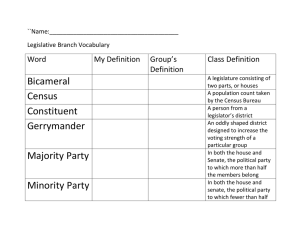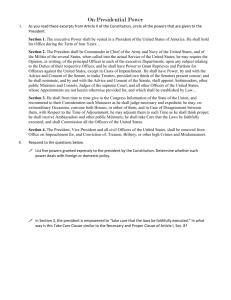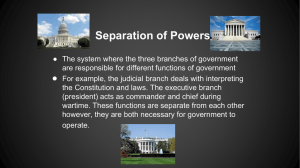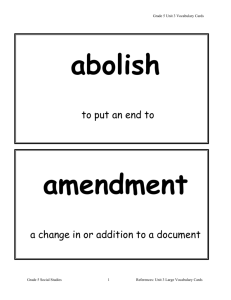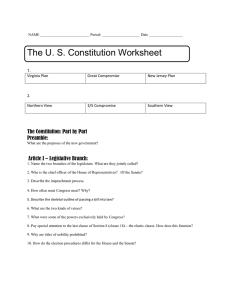Constitution Simply
advertisement
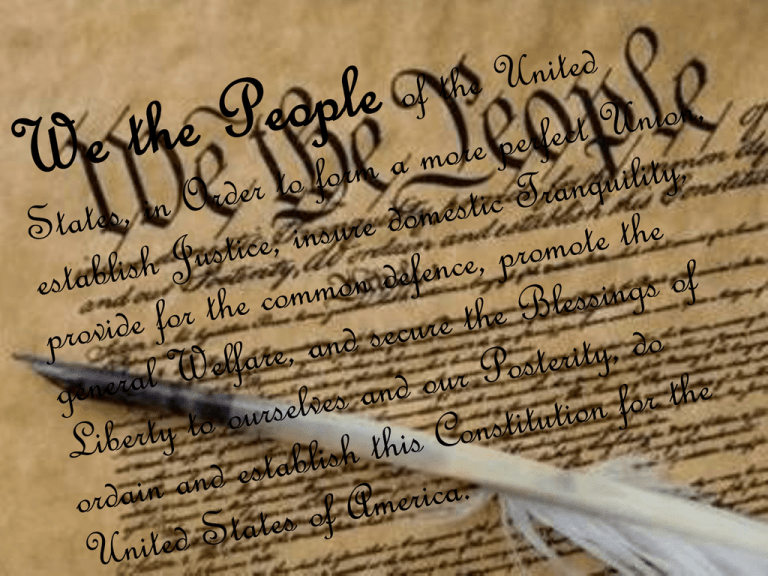
1. 2. 3. 4. 5. Legislative Powers Executive Powers Judicial Powers States Powers How to make amendment 6. National Debt validation, Supremacy of National Law, Oath to Constitution 7. Ratification of Constitution • Section 1 1. Congress = • • • Section 2…House of Reps = 1. Representatives a) elected every ___ yrs b) voted by ___________ election in the states c) Qualifications 1. must be _____ yrs old 2. must reside in state in which you are selected (Hillary Clinton) 3. Citizen for 7 years • 2. Paragraph 3…How the # of Reps is determined a) # of Reps in each state determined by ____________ • • • b) Representation #’s recalculated every _____ years…(?) • 3. House of Reps choose _______________________, which is the top position in the House of Reps • 4. House has sole power of… a) b) • Section 3…Senate = __________ House 1. Senators b) are elected every ___ years c) voted by _____________ election in the states (today) d) Qualifications 1. must be ____ years old…(?) 2. must reside in state in which you are selected (Hillary Clinton) 3. Must be a citizen for 9 years 2. Paragraph 2…Senate Classes a) 3 Senate Classes exist 1. about _____(think #) Senators are in each class (more on this) 3. President of the Senate = _______________________ a) what powers does he have? 4. Powers just for the Senate? a) • Laws are not amendments… – Not permanent • Can be removed • Can Expire – http://www.yout ube.com/watch ?v=x4ND1tBsM w0 • Proposed in House (or Senate) – Written in House Committee • Voted by House – Needs simple majority… • Goes to Senate – Rewritten in Senate Committee • Voted by Senate – Needs simple majority… • Needs to be identical bill • Given to President to sign • He can either (3) – Sign it – Veto it – Sit on it • Congress can override his veto (check to his power) with 2/3rd vote – Rare though • Flip to Article 5 • Amendment is permanent • First – 2/3 House & Senate approve – Amendment has ~7 years to be ratified – 3/4 of State Legs (38/50) ratify it • Second – 2/3 of state legislatures call for Convention to make an amendment • Congress is overridden – 3/4 of State Legs ratify it – Still hasn’t been done Section 8 1. 2. 3. 4. 5. 6. 7. 8. 9. 10. 11. 12. 13. 14. 15. 16. 17. create and collect taxes, duties, imposts and excises pay debts provide defense and general welfare borrow money regulate commerce create rules for naturalization… create rules for bankruptcies coin money establish post offices post roads granting patents and copyrights DECLARE WAR TO RAISE AND SUPPORT ARMIES TO PROVIDE AND MAINTAIN A NAVY to call militias (national guard) to uphold the Constitution use the national guard to suppress insurrections and invasions To make all Laws which shall be necessary and proper for carrying into Execution the foregoing Powers, and all other Powers vested by this Constitution in the Government of the United States, or in any Department or Officer thereof 17. To make all Laws which shall be necessary and proper for carrying into Execution the foregoing Powers, and all other Powers vested by this Constitution in the Government of the United States, or in any Department or Officer thereof 1. create and collect taxes, duties, imposts and excises 2. pay debts 3. provide defense and general welfare 4. borrow money 5. regulate commerce 6. create rules for naturalization… 7. create rules for bankruptcies 8. coin money 9. establish post offices 10. post roads 11. granting patents and copyrights 12. DECLARE WAR 13. TO RAISE AND SUPPORT ARMIES $$ 14. TO PROVIDE AND MAINTAIN A NAVY 15. to call militias (national guard) to uphold the Constitution 16. use the national guard to suppress insurrections and invasions 17. To make all Laws which shall be necessary and proper for carrying into Execution the foregoing Powers, and all other Powers vested by this Constitution in the Government of the United States, or in any Department or Officer thereof • In 1787, the US gov & its powers were SMALL… – Is it today? • Elastic Clause leads to MANY debates in US1… – Bank of the United States – Roads debate • And US2… – FDR and New Deal • And Philsosophically – Loose vs Strict • Section 9…Powers DENIED to Congress 1. Congress will not stop the migration and importation of “Such Persons” until 1808 • a. but it can put a tax on “Such Persons” 2. Writ of Habeas Corpus shall not be suspended unless in cases of Rebellion or Invasion and the public safety is in question… 3. No ex post facto Law shall be passed… 4. No title of nobility will be granted by the USA… • Section 10…Powers Denied to states (explains it) 1. create and collect taxes, duties, imposts and excises 2. pay debts 3. provide defense and general welfare 4. borrow money 5. regulate commerce 6. create rules for naturalization… 7. create rules for bankruptcies 8. coin money 9. establish post offices 10.post roads 11.granting patents and copyrights 12.declare war 13.to raise and support armies $$$ 14.to provide and maintain a navy 15.to call militias (national guard) to uphold the Constitution 16.use the national guard to suppress insurrections and invasions • Title = Elastic Clause • Look at the powers given to the Congress & try to determine how/where the following laws added power to Congress – – – – – – Patriot Act 2001 Japanese Internment Camps Affordable Care Act Federal Reserve SEC, EPA, FCC, FAA Immigration Law (never passed) of 2007 + 2011 – You come up with one • Is it or to have this in the Constitution? Why? • Title = Elastic Clause and Fed Gov = ? • Should we feel safe or threatened to know the Fed Gov has the Elastic Clause that allows them to add powers to their enumerated powers? • Is the Fed Gov growing too powerful for you on “the spectrum?” What events/laws supports your stance? • How was the Constitution designed to make sure the Fed Gov could not grow out of control?



